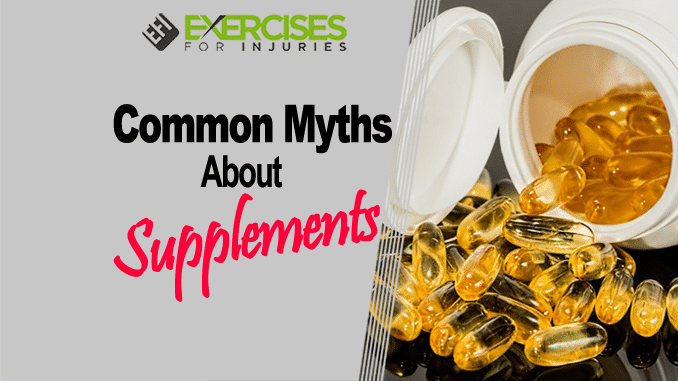
Americans spend $20 billion annually on dietary supplements, and by 2020, global sales will reach $40 billion. Supplements are a popular health trend, but they’re not always what they seem. Common myths about supplements are abundant, and understanding the facts is key to making informed decisions.
Types of Supplements
Different supplements are available for various purposes, from protein powders to multivitamins. While supplements can be helpful in certain situations, it is essential to know the facts to make the best possible decision for you and your health. First, it is necessary to understand that not all supplements are created equal. Some are well-researched and contain proven ingredients that can be effective for specific purposes, while others packed with fillers and little-to-no actual nutritional value. Additionally, there is a lot of conflicting information out there when it comes to supplementation. It is essential to do your research and talk to your doctor before starting any new regimen.
Natural and Organic Supplements
While there are tons of different supplements on the market, not all are good for you. Many “natural” and “organic” supplements contain dangerous chemicals and additives that can cause significant damage to your health. There are several myths out there surrounding supplements. The first is that they are more effective than actual medication. While they may be able to offer some benefits, they do not provide any real health benefits to someone who needs another kind of treatment. Another common myth is that they are safer than other medications. The truth is that there have been several cases of adverse reactions to natural and organic supplements. So, it’s essential to always speak to a doctor before taking any natural supplement.
Myths About Supplements
When people hear the word “supplement,” they automatically assume it’s a magical cure-all that will immediately make them healthier and more vibrant. In reality, supplements are just one piece of the puzzle regarding overall health, and they’re not necessarily suitable for everyone. There are a few common myths about supplements that many people believe: – Supplements are something you need to take every day to be healthy. Some people may only need to take certain supplements. At the same time, they’re pregnant, breastfeeding, or taking medication that interferes with their body’s natural ability to absorb specific vitamins and minerals. – Supplements can replace a healthy diet. Certain supplements can provide certain benefits, but they should not consider a substitute for a healthy diet. Eating a well-balanced diet that includes many fruits and vegetables daily is essential. – Supplements will cure all ailments. Some supplements can be helpful for certain conditions, such as vitamin D for healthy bones or fish oil for heart health, but they are not a cure-all for every malady under the sun.
What is a Supplement?
The word “supplement” is laden with meaning, and it’s essential to know its true meaning to use it properly. A supplement is a substance added to a nutrient-dense diet to help improve the absorption of the nutrients or provide other health benefits. Many accessories include vitamins, minerals, amino acids, fiber, and fatty acids. The reality is that most people don’t need supplements, and using them can be more harmful than helpful. There are so widely different accessory varieties out there, and the Food and Drug Administration (FDA) does not regulate them. The FDA can only control the ingredients in food products, not supplements themselves. Supplements should not solve long-term health issues. They’re best used short-term as a part of a healthy lifestyle that includes a healthy diet and exercise.
I have been chasing this guy all over the US and finally found him.
He specializes in supplements.
His name is Rob King.
I first met him in Orange County, California, and just met him in Las Vegas.
When in Las Vegas, we sat down and chatted about supplements.
- CLICK HERE to watch the interview on Common Myths About Supplements
Rick Kaselj, MS


